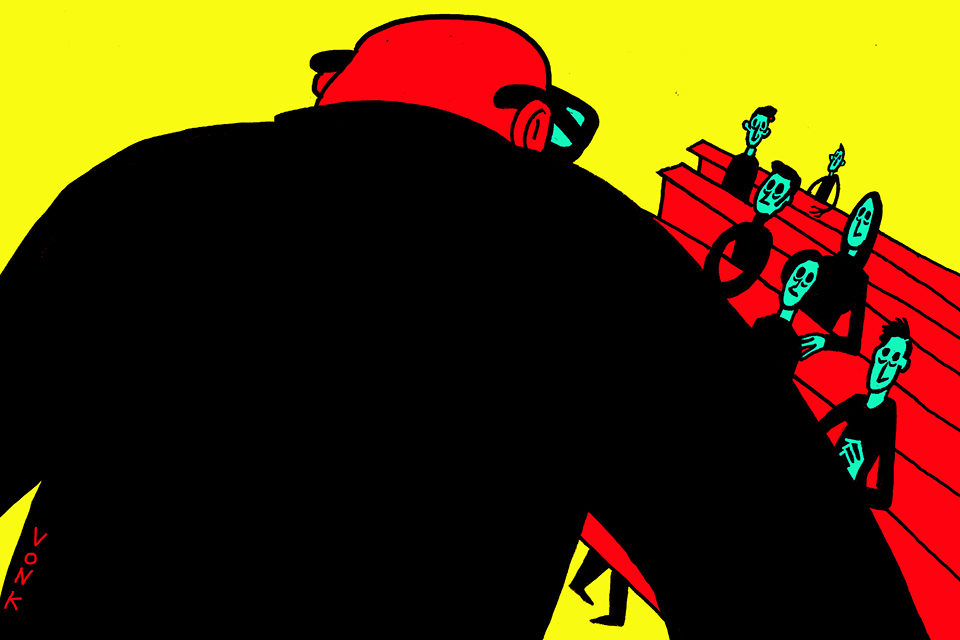Aanleiding voor het onderzoek was een artikel in Ad Valvas waarin vijftien medewerkers en oud-medewerkers zich beklaagden over de onveilige werksfeer en het weinig transparante beleid op de afdeling. In het onderzoek, uitgevoerd door Bezemer & Schubad, zijn 43 medewerkers van de afdeling geïnterviewd.
Achttien van hen herkennen zich niet in het geschetste beeld van het hoofd van de sectie Cognitieve psychologie, die een ernstig onveilig werkklimaat zou scheppen. Een enkeling ervaart deze sociale onveiligheid wel.
Wel vindt de helft van de geïnterviewden de managementkwaliteit van de afdeling ontoereikend en het beleid niet-transparant. En is er te veel onduidelijkheid en onzekerheid.
Summiere conclusies
De medewerkers van de afdeling krijgen vandaag een samenvatting van het rapport van twee pagina’s te zien. Dit benoemt de problemen in zeer algemene termen. Het hele rapport (130 pagina’s) wordt niet openbaar in verband met de privacy van de geïnterviewden en andere betrokkenen. Maar de samenvatting is op sommige punten wel erg summier.
Zo zijn de conclusies bijvoorbeeld niet uitgesplitst naar de drie secties: Sociale psychologie, Cognitieve psychologie en Organisatiepsychologie. Er staat dat de problemen met name bij twee van de drie secties spelen, maar welke dat zijn wordt niet benoemd. Decaan Maurits van Tulder: “Dat gaan we ook niet doen. Deze issues zijn herkenbaar voor de hele faculteit, de hele VU en de hele academische wereld, wijzen naar bepaalde afdelingen of bepaalde personen heeft geen zin. Ik wil vooruitkijken.”
Excuses
De decaan is blij met het rapport omdat hem dat een goed inzicht geeft in wat er moet verbeteren bij de afdeling. In een schriftelijke reactie stelt Van Tulder: ‘We concluderen dat zich een aantal gebeurtenissen en ervaringen aan de waarneming van het faculteitsbestuur heeft onttrokken.’
Een voorbeeld daarvan zijn de vier oud-medewerkers die een contract hadden als docent (zonder onderzoekstijd), terwijl tegen hen was gezegd dat ze als assistent-professor in dienst waren. Tulder heeft aan een van hen zijn excuses aangeboden namens de faculteit en wil dat ook aan de anderen doen.
‘Het personeelsbeleid moet duidelijker’
Meer structureel valt er veel te verbeteren op het gebied van personeelsbeleid, management en leiderschap. “Het personeelsbeleid moet duidelijker”, stelt de decaan, “met heldere criteria voor bijvoorbeeld tenure-tracks, bevorderingen en vaste aanstellingen. Tegelijk willen we van die eenzijdige nadruk op meetlatten af. Dat is complex, maar we moeten daar wel echt een verbeterslag maken. Medewerkers moeten in een eerder stadium weten waar ze aan toe zijn en als ze niet kunnen blijven, hebben wij in mijn ogen de plicht om ze te helpen bij het zoeken naar een nieuwe baan.”
Betere begeleiding voor promovendi is ook een van de verbeterpunten: “We willen ervan af dat de hoogleraar in z’n eentje promovendi begeleidt. Een copromotor, die bijvoorbeeld universitair docent is, staat veel dichterbij de promovendus en is daardoor geschikter voor de dagelijkse begeleiding. Ik vind dat promovendi minstens twee begeleiders moeten hebben en bij interdisciplinair onderzoek zelfs drie of vier uit de verschillende vakgebieden.”
Roulerend leiderschap
Het leiderschap van een sectie zou, net als andere leidinggevende functies aan de VU, moeten rouleren, vindt de decaan. Hij denkt aan een benoemingsperiode van vier jaar. En die functie hoeft niet per se te worden ingekleed door een hoogleraar: “Als je een universitair hoofddocent of docent hebt die goed is in management en daar affiniteit mee heeft, kan dat een prima sectiehoofd zijn.”
‘Goede wetenschappers zijn niet automatisch goede managers’
Sowieso moet er betere begeleiding komen voor leidinggevenden: coaching, 360-graden feedback, leiderschapscursussen. “Ik ben uiteindelijk decaan geworden omdat ik een goede wetenschapper was en dat geldt voor de meeste leidinggevenden in de universitaire wereld. Maar goede wetenschappers zijn niet automatisch goede managers. En de begeleiding die managers tot nu toe kregen is echt te mager”, stelt Van Tulder.
Hoogoplopende emoties
De decaan hoopt dat met het rapport een periode van onrust bij de afdeling kan worden afgesloten. Binnenkort begint het zoeken naar een nieuwe afdelingsleider. “In eerste instantie zoeken we iemand binnen de afdeling”, zegt Van Tulder, “alleen als dat niet lukt, iemand van buiten.”
De emoties van zowel fans als tegenstanders van de huidige leidinggevenden liepen de afgelopen tijd hoog op. “Mensen zijn heel gepassioneerd hierover”, zegt Van Tulder, “het laat niemand koud.” Hij hoopt dat zowel voor- als tegenstanders het rapport van Bezemer & Schubad kunnen accepteren als nieuw vertrekpunt en oude tegenstellingen naast zich neer kunnen leggen.
Ook hoopt de decaan dat er een open cultuur zal ontstaan, waardoor medewerkers het eerder bespreken als hen iets dwarszit. “Dat vereist meer sensitiviteit van leidinggevenden op dit vlak en dat is in het verleden niet altijd goed gegaan. Ik hoop echt dat we daar de komende jaren wat kunnen verbeteren.”
Wil je reageren of ook iets melden over sociale veiligheid in de universitaire wereld? Mail naar: advalvas@protonmail.com.
